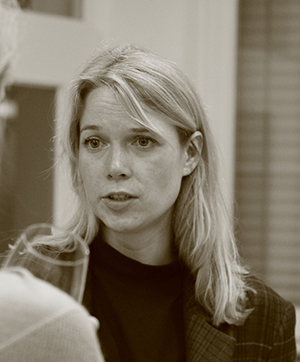Gwendolin Lehnerer, M.A. BA
Gwendolin Domenica Lehnerer, wohnhaft in Berlin, studierte Theaterwissenschaft, Philosophie und Medienkulturwissenschaft an der Ludwig-Maximilians-Universität München. Von 2017-2019 arbeitete Gwendolin Lehnerer als wissenschaftliche Assistentin für das ERC-Projekt „Developing Theatre“ sowie als Assistentin für das „Centre for Global Theatre History“. Im Jahr 2018 nahm sie erfolgreich an dem Universitätslehrgang „Kuratieren in den szenischen Künsten“ teil, bei dem sie ein Teil-Stipendium der Kulturstiftung Allianz erhielt. Seit 2019 ist sie Doktorandin an dem Interuniversitärem Doktoratskolleg „Die Künste und ihre öffentliche Wirkung: Dynamiken des Wandels“ an der Universität Salzburg und dem Mozarteum.
Dissertationsvorhaben:
Kuratorische Forschung. Neo-barocke Forschungspraktiken im Dispositiv der Ausstellung und des Theaters
Erstbetreuerin: Univ. Prof.in Dr.in Nicole Haitzinger, Paris-Lodron-Universität Salzburg, Fachbereich Kunst-, Musik- und Tanzwissenschaft
Zweitbetreuerin: Prof.in Dr.in Nora Sternfeld, Hochschule für bildende Künste Hamburg, Kunstpädagogik
Abstract
Das Dissertationsprojekt untersucht die ab den 1990er Jahren im deutschsprachigen Raum auftretende transdisziplinäre Kuratierung der Künste als Praxis sowie die Frage nach dem Kuratorischen als Methode der Wissensgenerierung- und präsentation.
Das transdisziplinäre Kuratieren wird als Zeigepraxis im Dispositiv des Theaters untersucht und die kuratorische Aussage als barocke Konstellation betrachtet. Barock wird hier als formaltypologisches Stilphänomen wiedererkannt, dass historisch in den szenischen Künsten und ihrer Kuratierung mündet. Dazu wird die kuratorische Situation von der Forschungskammer in Historie und Gegenwart exemplarisch zur Untersuchung kommen, angelehnt an die Ausstellungsgeschichte und diese zugleich auf das Performative hin spezifizierend. Außerdem wird das Spannungsdreieck zwischen Kunst, Kuration und Forschung an Hand zeitgenössischer Theater- und Kunstinstitutionen beleuchtet. Anwendungsfelder sind „Theater als Campus“, Festivals und Kulturinstitutionen wie das HAU in Berlin, das Spielart Festival in München oder das Haus der Kulturen der Welt. Ziel der Untersuchung ist es, ein Phänomen, das ich mit Curatorial Research benennen möchte, zu bestimmen und hierfür eine spezifische Performanztheorie zu entwickeln. Diese ermöglicht, so die These, eine transdisziplinäre Wissenskuratierung im Zeichen einer gegenwärtigen ‚Wissensgesellschaft‘ zu bestimmen und sie aus der Genealogie der Ausstellungsgeschichte herauszuschreiben, sprich sie zu situieren.
Curatorial Research. Neo-Baroque Research Practices in the Dispositif of Exhibition and Theatre
The dissertation project investigates the transdisciplinary curating of the arts as practice, which has occurred since the 1990s in German-speaking countries, as well as the question of the curatorial as a method of knowledge generation and presentation.
Transdisciplinary curating is examined as a show practice in the theatre’s apparatus and the curatorial statement as a baroque constellation. Baroque is recognized here as a formal typological style phenomenon that historically flows in the scenic arts and their curating. In addition, the curatorial situation of the research chamber in the past and present will be examined in exemplary fashion, based on the history of the exhibition and at the same time specifying it in terms of the performative. Furthermore, the tension triangle between art, curation and research will be explored on the basis of contemporary theatre and art institutions. Fields of application are ‘Theatre as a campus‘, festivals and cultural institutions such as the HAU in Berlin, the SPIELART Festival in Munich or the Haus der Kulturen der Welt. The aim of the study is to determine a phenomenon that I would like to call the ‘Curatorial Research ‘, and to develop a specific performance theory for it. According to the thesis, this makes it possible to determine a transdisciplinary curating of knowledge in the sign of a contemporary ‘knowledge society’ and to write it out of the genealogy of exhibition history, i.e. to situate it.
Short biography
Gwendolin Domenica Lehnerer, resident in Berlin, studied theatre studies, philosophy and media and culture studies in the Cluster of Excellence at the Ludwig-Maximilians-Universität in Munich. From 2017-2019 Gwendolin Lehnerer worked as a research assistant for the ERC project “Developing Theatre” and as an assistant for the “Centre for Global Theatre History”. In 2018 she successfully participated in the university course “Curating in the Scenic Arts”, where she received a partial scholarship from the cultural foundation Allianz. Since 2019-2022 she has been a doctoral student at the Inter-University Doctoral College “The Arts and their Public Impact: Dynamics of Change” at the University of Salzburg and the Mozarteum and works as a freelance dramaturg and curator.






